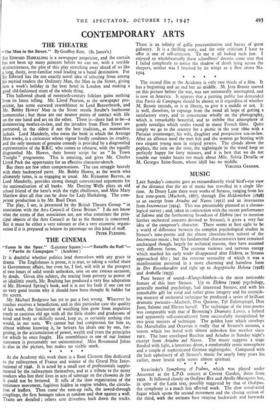CONTEMPORARY ARTS
THE THEATRE
"The Man in the Street." By Geoffrey Kerr. (St. James's.)
SIR EDWARD HARICALONG is a newspaper proprietor, and the curtain has not been up many jninutes before we can see, with a terrible distinctiveness, the plot of this play stretching away ahead of us like a long, dusty, over-familiar road leading to a banal destination. For Sir Edward has the not exactly novel idea of selecting from among his myriad readers the Ordinary Man, the Man in the Street, giving him a week's holiday in the best hotel in London and making a good old-fashioned stunt of the whole thing. This hallowed chunk of twentieth-century folklore gains nothing from its latest telling. Mr. Lloyd Pearson, as the newspaper pro- prietor, has some outward resemblance to Lord Beaverbrook, and Mr. Bobby Howes' Man in the Street recalls Strube's loathsome homunculus ; but those are our nearest points of contact with life on the one hand and art on the other. There is—there had to be—a domineering mother-in-law, and the invaders from Fleet Street are portrayed, in the oldest if not the best tradition,, as mannerless jackals. Lord Manderly, who owns the bank in which the Average Man works, is a caricature whose vigour hardly condones its crudity, and the only moment of genuine comedy is provided by a disgruntled representative of the B.B.C. who comes to rehearse, with the equally disgruntled Mr. Howes, their breezy script for an "In Town Tonight" programme. This is amusing, and gives Mr. Charles Lloyd Pack the opportunity for an effective character-sketch.
But there are few other compensations. The cast struggle bravely with their hackneyed parts. Mr. Bobby Howes as the worm who
ultimately turns, is as engaging as usual. Mr. Howes, Reeves, as Lord Manderly, provides strong though conventional arguments for the nationalisation of all banks. Mr. Deering Wells plays an old school friend of the hero's with the right ebullience, and Miss Mary Martlew does all that can be done for Lady Harkalong. The com- petent production is by Mr. Basil Dean.
The play, I see is presented by the British Theatre Group "in association with the Arts Council of Great Britain." I do not know what the terms of that association are, nor what constitute the prin- cipal objects of the Arts Council as far as the theatre is concerned. But it must be either a very tolerant or else a very eccentric organi- sation if it is prepared to bestow its patronage on this kind of stuff.
PETER FLEMING.


































 Previous page
Previous page